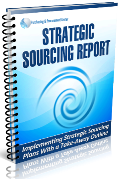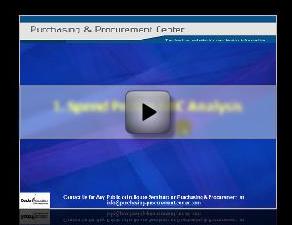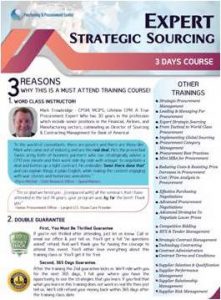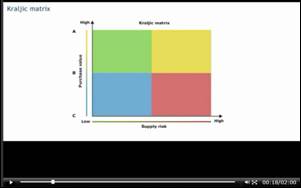CPSM vs CSCP vs CIPM: Which is Right for You?

When it comes to procurement certification, the choice often boils down to CPSM vs CSCP.
Both certifications offer strong credentials, but how do they compare with Certified International Procurement Manager (CIPM)?
In this guide, we'll dive into the details of each certification and help you figure out which one aligns with your career goals.
Check Out: Practical & Real-Life Procurement Training Courses
CPSM, CSCP, and CIPM
If you’re considering advancing your procurement career, certifications like CPSM (Certified Professional in Supply Management), CSCP (Certified Supply Chain Professional), and CIPM (Certified International Procurement Manager) are excellent choices.
Understanding the differences between these options—CPSM vs CSCP vs CIPM—can help you choose the best path for your professional development.
CPSM: Certified Professional in Supply Management
The CPSM focuses specifically on procurement and supply management. It’s designed for professionals who want to specialize in areas like procurement, sourcing, and supply chain risk management.
Who is CPSM for?
CPSM is ideal for procurement and supply chain management professionals who want to deepen their expertise. It’s especially useful for those focusing on strategic sourcing, supplier relationships, and purchasing.
What does CPSM cover?
The CPSM curriculum includes three major exams, focusing on:
- Supply management core concepts
- Supply chain integration
- Leadership in supply management
These exams ensure that professionals understand procurement from both a strategic and operational perspective. CPSM emphasizes theoretical knowledge and structured learning.
Eligibility and Cost
To qualify for CPSM, candidates need at least three years of full-time, professional supply chain experience and a bachelor's degree or five years of relevant experience without a degree.
The cost for the certification process ranges from around $1,200 to $1,500, depending on the study materials and exam fees.
Read More: Top 3 Best Procurement Certifications
CSCP: Certified Supply Chain Professional
The CSCP certification provides a broad view of the supply chain, covering everything from raw material suppliers to final customer delivery. CSCP is designed to help professionals understand how different elements of the supply chain work together.
Who is CSCP for?
CSCP is perfect for professionals who want a broader perspective on the entire supply chain, not just procurement. This certification suits those aiming for leadership positions in supply chain management, logistics, and operations.
What does CSCP cover?
CSCP certification covers:
- Supply chain design and planning
- Supplier and customer relationship management
- Supply chain risk management
With a focus on integrating supply chain processes, CSCP prepares professionals to streamline operations and improve efficiency across the entire supply chain.
Eligibility and Cost
To be eligible for CSCP, candidates must have at least three years of related business experience or a bachelor’s degree. The certification cost is approximately $1,000 to $2,000, depending on where you are taking the course and the study materials chosen.
CIPM: Certified International Procurement Manager
The CIPM certification focuses on practical skills that procurement managers can immediately apply in their work. It’s a globally recognized program aimed at senior procurement professionals looking to advance into management roles.
Who is CIPM for?
CIPM is best suited for professionals who already have experience in procurement and want to gain more practical, hands-on skills to manage procurement processes effectively. This certification is designed to provide immediate, actionable knowledge.
What does CIPM cover?
CIPM includes the following key areas:
- Leadership and management in procurement
- Supplier relationship management
- Strategic sourcing and global sourcing
The course is practical and directly applicable to real-world procurement challenges, making it a valuable investment for experienced professionals looking to enhance their leadership and strategic skills.
Eligibility and Cost
Candidates must have five years of procurement experience or have completed the CIPP (Certified International Procurement Professional) certification. The cost of CIPM offered by the Purchasing & Procurement Center is $2,245, which includes live virtual lectures, study guides, and the final certification exam.
Check out these practical and recognized certifications to level up your logistics skills here.
CPSM vs CSCP vs CIPM: Which Should You Choose?
When deciding between CPSM, CSCP, and CIPM, your choice should depend on your career goals and learning preferences.
- CPSM vs CSCP: Both certifications offer a solid foundation in procurement and supply chain management, with CSCP providing a broader view of the entire supply chain, while CPSM focuses on procurement and strategic sourcing.
If you're aiming for a more specialized role within procurement, CPSM is your best bet. If you're looking for a well-rounded understanding of the entire supply chain, CSCP is the way to go.
- CPSM/CSCP vs CIPM: CPSM and CSCP offer a structured approach to learning, providing a strong theoretical foundation. However, if you want a more practical certification that focuses on hands-on skills you can implement immediately, CIPM stands out as the better option.
It’s also more value for money, especially if you’re looking for real-world application rather than just theoretical knowledge.
For top-level procurement executives who need to manage global supply chains and drive efficiency in their organizations, the CIPM is a more practical choice, offering tools and strategies that can be implemented right away.
Register Now: From Tactical to Strategic Procurement Training
Apply Now!

The CIPM is ideal for professionals seeking to manage procurement functions at the highest level with immediate impact.
Click here to register for the CIPM certification or call +1-312-300-8968 for more information!
Q. What is the key difference between CPSM and CSCP?
Q. What is the key difference between CPSM and CSCP?
A: CPSM focuses specifically on procurement and strategic sourcing, while CSCP offers a broader view of the entire supply chain, including logistics, operations, and customer relationships.
Q. Is CIPM more practical than CPSM and CSCP?
Q. Is CIPM more practical than CPSM and CSCP?
A: Yes, CIPM is designed to provide practical, hands-on skills that can be implemented immediately in procurement roles, making it more practical than the more theoretical CPSM and CSCP certifications.
Q. Who is eligible for CIPM?
Q. Who is eligible for CIPM?
A: CIPM is suitable for professionals with at least five years of procurement experience or those who have completed the CIPP certification.
Q: How much does the CIPM certification cost?
Q: How much does the CIPM certification cost?
A: The cost of the CIPM certification is $2,245, which includes live virtual training sessions, study materials, and the final exam.
Written by Lindsay Chesar (Education Director), Edited by Artin Vaqari (CEO Purchasing & Procurement Center), Updated by Azmi Anees









